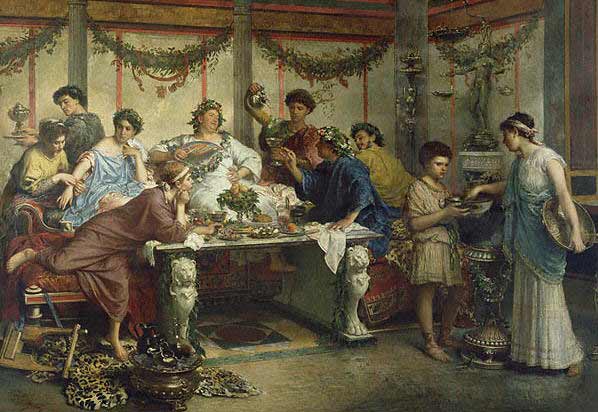Parentalia
Parentalia
The Parentalia is the Roman festival for honoring one's dead parents. Families gathered amongst the tombs of loved ones and made offerings or sacrifices of grain and wine to their souls. Although the Parentalia always began with the performance of ceremonies in honor of dead parents by a Vestal Virgin, Romans basically celebrated the Parentalia at the family level. Families walked outside the city to visit the family tombs and performed private sacrifices in honor of dead kin (especially parents). The sacrifices were simple, a little wine, a little corn or bread, perhaps some votive garlands. It was a quiet, personal, reflective day, followed by a quiet reflective week or so to think about loved ones and the importance of the family. The Parentalia was the first of three Roman festivals in February for appeasing the dead which started on the Ides and lasted until the 22nd. During this time all temples were closed, marriages were forbidden, and public officials suspended business for the duration of the festivals.

"The altars of rustic Faunus smoke, on the Ides. There, where the island breaks Tiber's waters. This was the day when three hundred and six of the Fabii fell to Veientine weapons. A single family assumed the burden and defence of the city: Their strong right arms volunteered their swords. Noble soldiers they marched from the one camp, And any one of them was fitted to be the leader. The nearest way was the right hand arch of Carmentis Gate Let no one go that way: it is unlucky. Tradition says that the three hundred Fabii passed through: The gate is free of blame, but is still unlucky." - Ovid, Fasti II
"When the others refused their offer and chose the death befitting men of noble birth, the Tyrrhenians renewed the struggle, attacking them in relays, though no longer fighting at close quarters in hand-to-hand combat, but standing in a body and hurling javelins and stones at them from a distance; and the multitude of missiles was like a snow-storm. The Romans, massing by companies, rushed upon their foes, who did not stand their ground, and though they received many wounds from those surrounding them, they stood firm. But when the swords of many had become useless, some having their edges blunted and others being broken, and the borders of their shields next the rims were hacked in pieces, and the men themselves were for the most part bled white and overwhelmed by missiles and their limbs paralysed by reason of the multitude of their wounds, the Tyrrhenians scorned them and came to close quarters. Then the Romans, rushing at them like wild beasts, seized their spears and broke them, grasped their swords by the edges and wrenched them out of their hands, and twisting the bodies of their antagonists, fell with them to the ground, locked in close embrace, fighting with greater rage than strength. Hence the enemy, astonished at their endurance and terrified at the madness that had seized them in their despair of life, no longer ventured to come to grips with them, but retiring again, stood in a body and hurled at them sticks, stones, and anything else they could lay their hands on, and at last buried them under the multitude of missiles. After destroying these men they ran to the fortress, carrying with them the heads of the most prominent, expecting to take the men there prisoners at their first onset." - Dionysius of Halicarnassus 9.21
In the 480s B.C., the gens Fabius was one of the most powerful familial groups in Rome. The Fabii had major Etruscan connections and owned a considerable tract of land between Rome and Veii. A major strategic point on the Via Salaria, or Salt Road between Rome and Veii was where the stream Cremora joined the Tiber. The Fabii and the Veians came into conflict with each other during this period, mainly through mutual cattle raiding. Then, the Fabii built a defensive blockhouse at the Cremora which the Veians considered a challenge thrown in their teeth. Now the Fabii had raised a large semi - private army who owed their allegiance not to the Roman state but to the Fabian Gens. Thre hundred of the Fabii and their clients occupied the blockhouse with intentions of holding this strongpoint against Veii in 476. This led to the Battle of the Cremora in which three hundred Fabii were killed and the area was abandoned to the Veiians.
Scio versiculis meis evenire, ut fastidiose legantur: quippe sic meritum est eorum. Sed quosdam solet commendare materia et aliquotiens fortasse lectorem solum lemma sollicitat tituli, ut festivitate persuasus et ineptiam ferre contentus sit. Hoc opusculum nec materia amoenum est nec appellatione iucundum. Habet maestam religionem, qua carorum meorum obitus tristi affectione commemoro. Titulus libelli est Parentalia. Antiquae appellationis hic dies et iam inde ab Numa cognatorum inferiis institutus: nec quicquam sanctius habet reverentia superstitum quam ut amissos venerabiliter recordetur. - Praefatio for the Parentalia, unknown edition